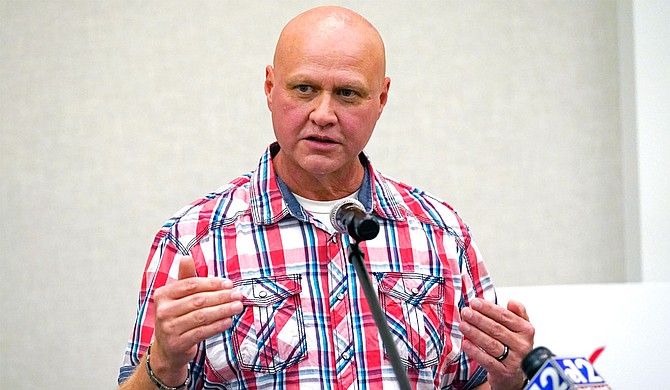Ronnie Pollard, a former lieutenant with the DeSoto County Sheriff's Department, explains why he is in support of Initiative 65, a strictly regulated medical marijuana program, that is on the general election ballot this November, during a Wednesday, Oct. 22, 2020 news conference in Jackson. Photo by Rogelio V. Solis via AP
JACKSON, Miss. (AP) — The Mississippi Supreme Court will wait until after next week's election to consider whether a medical marijuana initiative got onto the ballot through proper procedures.
Chief Justice Mike Randolph filed a one-page order Wednesday giving Secretary of State Michael Watson a Nov. 6 deadline to respond to written arguments filed Tuesday by Madison Mayor Mary Hawkins Butler. That deadline is three days after the election. Watson's arguments originally were due by Wednesday.
Butler argued that the number of signatures gathered for Initiative 65 does not meet standards outlined in the state constitution. Watson's predecessor as secretary of state, Delbert Hosemann, said the initiative qualified for the ballot months ago.
Supporters of Initiative 65 said their petition process met the requirements set by the constitution and by a 2009 attorney general’s opinion. They also accused Butler and the city of Madison of trying to undermine the initiative.
The Mississippi initiative process requires petitioners to gather signatures from registered voters, getting no more than one-fifth of the signatures from any congressional district.
Mississippi had five congressional districts in the 1990s when the initiative process was established, but the state dropped to four congressional districts after the 2000 Census. Butler argued it’s “a mathematical certainty” that more than one-fifth of the signatures for Initiative 65 came from at least one of the four congressional districts.
In a legal opinion dealing with initiatives, the Mississippi attorney general’s office said in 2009 that the secretary of state should require an equal number of signatures from each of the five old congressional districts.
Initiative 65 would allow patients to use medical marijuana to treat debilitating conditions, as certified by physicians.
An alternative measure that is also on the Mississippi ballot, Initiative 65A, also would allow patients with debilitating conditions to use medical marijuana, but it does not specify that those would have to be certified by physicians. It says the state would create a program based on “sound medical principles.”
More than 100,000 registered voters petitioned to put Initiative 65 on the ballot. The alternative was put there by legislators. Sponsors of the original initiative say the alternative is intended to cause confusion and kill the original.
There’s a two-step process for voting on 65 and 65A. The ballot first instructs people to “Vote for approval of either, or against both.” It then says, “And vote for one” — either 65 or 65A.
Watson has said that even if people vote against both initiatives on the first part, they can still vote for one of the proposals on the second part.



Comments
Use the comment form below to begin a discussion about this content.